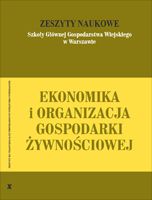Main Article Content
Article Details
A. Krueger, M. Schiff, A. Valdes, 1988: Agricultural incentives in developing countries: measuring the effect of sectoral and economywide policies. The World Bank Economic Review., vol. 2, nr 3, str. 255-271. (Crossref)
B. Hill, 1992: Total income of agricultural households: 1992 Report., Eurostat, Luxembourg.
B.L. Gardner, 1992: Changing economic perspectives on the farm problem, Journal of Economic Literature, vol. XXX, str. 62-101.
D. Newbery, 1987: The theory of agricultural taxation for developing countries. [W]: D. Newbery, N. Stern (ed.): The theory of taxation in developing countries.
D.W. Pearse, 1993: MacMillan Dictionary of Modern Economics., Wyd. MacMillan. (Crossref)
European Commission (1996): European Economy, Annual Economic Report for 1995.
European Commission, 1993: EC agricultural policyforthe21st century. Explaining agricultural policy, Brussels.
European Commission, 1996: The Agricultural Situation in the European Union. 1995 Report, Wyd. ESSC Brussels.
Eurostat (1996): Revenue Agricole 1995.
K. Anderson, Y. Rayami, 1986: The political economy of agricultural protection: East Asia in international perspective., Wyd. Allen i Unwin, Londyn.
M. Honma, Y. Hayami, 1986: The determinants of agricultural protection levels: an econometric analysis. [W]: K. Anderson, Y. Hayami: The political economy of agricultural protection: East Asia in intonational perspective., wyd. Allen and Unwin, Londyn str. 39-49.
M. Tracy, 1989: Government and agriculture in Western Europe 1980,-1988, 3rd ed. Harvester Wheatsleaf.
P.H. Lindert, 1991: Historical patterns of agricultural policy. [W] C.P. Timmer (wyd.), 1991: Agriculture and the State.
W. Michna: Bezpieczeństwo żywnościowe i polityka rolna Polski na przełomie XX i XXI wieku., [W]: Polityka ekonomiczna i społeczna, zeszyt 22, Wyd. Fundacja im. Friedricha Eberta, Warszawa 1992.
Downloads
- Aldona Zawojska, Bureaucracy and Country's Economic Growth , Zeszyty Naukowe SGGW - Ekonomika i Organizacja Gospodarki Żywnościowej: No. 52 (2004)
- Aldona Zawojska, Beata Horbowiec-Janucik, THE IMPACT OF SANITARY BARRIERS TO TRADE IN ANIMAL PRODUCTS ON GREAT BRITAIN’S ECONOMY , Zeszyty Naukowe SGGW - Ekonomika i Organizacja Gospodarki Żywnościowej: No. 120 (2017)
- Aldona Zawojska, Euro Zone versus new Member States of the European Union - Economic Divergence or Convergence? , Zeszyty Naukowe SGGW - Ekonomika i Organizacja Gospodarki Żywnościowej: No. 53 (2004)
- Aldona Zawojska, Exploitation of migrant labour force in the EU agriculture , Zeszyty Naukowe SGGW - Ekonomika i Organizacja Gospodarki Żywnościowej: No. 116 (2016)
- Aldona Zawojska, Beata Horbowiec, Price risk in agri-food market: sources, effects and managing methods , Zeszyty Naukowe SGGW - Ekonomika i Organizacja Gospodarki Żywnościowej: No. 115 (2016)
- Aldona Zawojska, Magdalena Pisa, Fiscal policy as a stabilizer of business cycle fluctuations: Real Business Cycle model and OECD empirical evidence over 1970–2005 , Zeszyty Naukowe SGGW - Ekonomika i Organizacja Gospodarki Żywnościowej: No. 63 (2007)
- Aldona Zawojska, Income Results in Holdings by Type of Farming in France, Germany and the United Kingdom , Zeszyty Naukowe SGGW - Ekonomika i Organizacja Gospodarki Żywnościowej: No. 30 (1997)
- Aldona Zawojska, Beata Horbowiec, Aneta Kalisiak, Sources of financing of production and investments in individual farms in Poland , Zeszyty Naukowe SGGW - Ekonomika i Organizacja Gospodarki Żywnościowej: No. 116 (2016)
- Aldona Zawojska, Joanna Domańska, Assessing Activities and Employees of the Agency for Restructuring and Modernization of Agriculture: A Case Study of Selected Local Office , Zeszyty Naukowe SGGW - Ekonomika i Organizacja Gospodarki Żywnościowej: No. 72 (2008)
- Włodzimierz Stulgis, Aldona Zawojska, Fiscal aspects of agricultural policy , Zeszyty Naukowe SGGW - Ekonomika i Organizacja Gospodarki Żywnościowej: No. 1 (1995)





